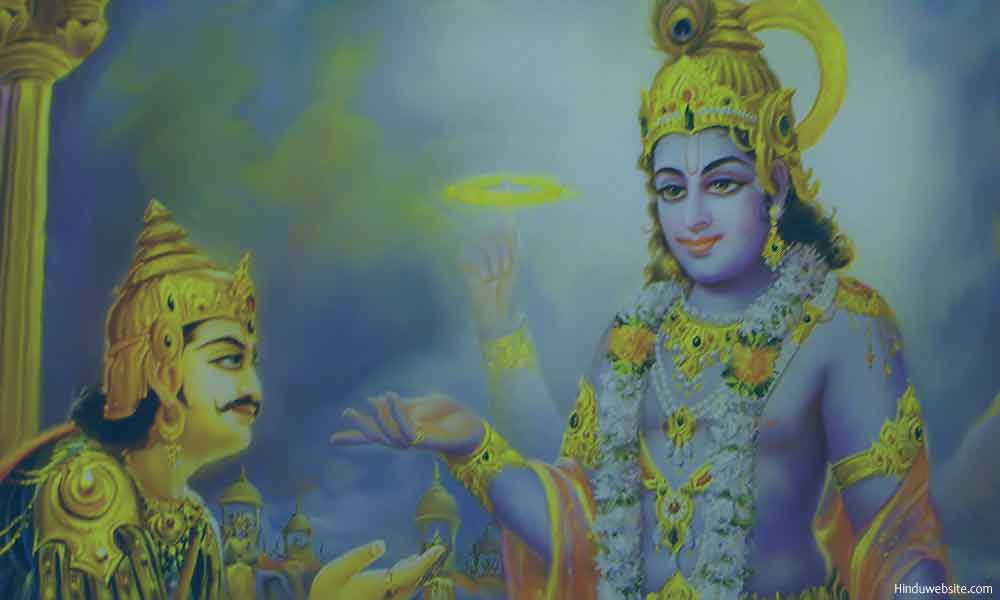
Was Arjuna a Coward Who Was Afraid to Fight?

Notes: I have translated the Bhagavadgita twice. The first one was a loose translation. The second one was a word to word translation with a detailed commentary. The commentary is however different from what you will find here. In this section I will share with you my thoughts about the knowledge, philosophy and wisdom of the Bhagavadgita as I understand it from my perspective. Jayaram V
Summary: According to our scriptures, we are not totally at the mercy of gods. Brahma, the creator created a level playing field for both humans and gods by making them interdependent. The gods need you as much as you need them. If you ignore them you will harm yourself and harm them and harm the world. It means that when you ignore them you incur negative karma in three ways and greatly reduce your chances of a good life in the next birth. Besides it will take your straight into the hands of the Asuras (demons) and make you a slave to them. Evil grows in us and in the world when we neglect the gods who reside in us.
You are aware that the Bhagavadgita starts with Arjuna's sorrow and his reluctance to wage the war. In the second chapter (2.3), Lord Krishna describes Arjuna's state of mind as klaibyam, meaning mental weakness, cowardice or fear. He says, "Klabyam ma sma gamah Partha," meaning, "do not succumb to mental weakness, O Partha. " He further adds that it does not suit him.
The question that we need to examine is whether Arjuna was a coward, who was afraid of participating in the war. Let us analyze it.
Fear can arise for two reasons, fear that you may be hurt or harmed by someone, and fear that you may hurt and harm someone. The former is a kind of selfish fear arising from your longing for life or your desire to live. The latter arises from compassion, sensitivity, and concern for the life of others. From the worldly perspective some people may consider it a mental weakness, but it is certainly not cowardice.
You might have seen that kind of sensitivity in real life, or you might have felt it yourself, like when you handle a baby, carry a little puppy in your hands, or when you have to cut down the branches of a tree where some birds have their nests. People engaged in the legal profession, military, and law and order constantly face the problem. You might have seen it in reality television shows like the American Idol where the judges hesitate to pass negative comments about the contestants or disqualify them. It is very difficult to tell young contestants looking into their eyes that their performance is not up to the mark or they are not qualified to continue.
Therefore, we cannot say that Arjuna was a coward. He was not worried about his life, but about the possibility that he might have to kill many relations on the opposite side, including those whom he loved like Bhishma and Drona.
Suggestions for Further Reading
- The Wisdom of the Bhagavadgita, Main Page
- The Wisdom of the Upanishads, Main Page
- The Bhagavad-Gita Essays and Translations
- An Introduction To The Bhagavad-Gita And Its Three Secrets
- Why to Study the Bhagavadgita Parts 1 to 4
- The Abbreviated Bhagavadgita
- The Problem of Maya Or Illusion and How To Deal With It
- The Problem of Maya Or Illusion and How To Deal With It
- The Bhagavadgita, Philosophy and Concepts
- The Many Gods and Goddesses of Hinduism
- Divine Qualities Of A True Worshipper Of God
- The Bhagavadgita on Karma, the Law of Actions
- Maya, The Grand Illusion Or The Delusion Of The Mind
- Aspects, Emanations, Incarnations and Forms of God Vishnu
- Dvaita or Advaita What is the Truth?
- Symbolism in the Bhagavadgita
- The Truth About Karma
- Meaning and Definition of Bhagavan
- Brahman the Supreme Universal Lord of All
- What is Bhakti or Devotion?
- Bhakti Marg, the Path of Devotion
- History and information about Mathura and Vrindavan Temples
- True Devotion and Qualities of a True Devotee
- Essays On Sorrow And Its Spiritual Significance
- The Yoga of Knowledge or the Samkhya Yoga, Verses and Commnetary by Jayaram V
- Essays On Dharma
- Esoteric Mystic Hinduism
- Introduction to Hinduism
- Hindu Way of Life
- Essays On Karma
- Hindu Rites and Rituals
- The Origin of The Sanskrit Language
- Symbolism in Hinduism
- Essays on The Upanishads
- Concepts of Hinduism
- Essays on Atman
- Hindu Festivals
- Spiritual Practice
- Right Living
- Yoga of Sorrow
- Happiness
- Mental Health
- Concepts of Buddhism
- General Essays